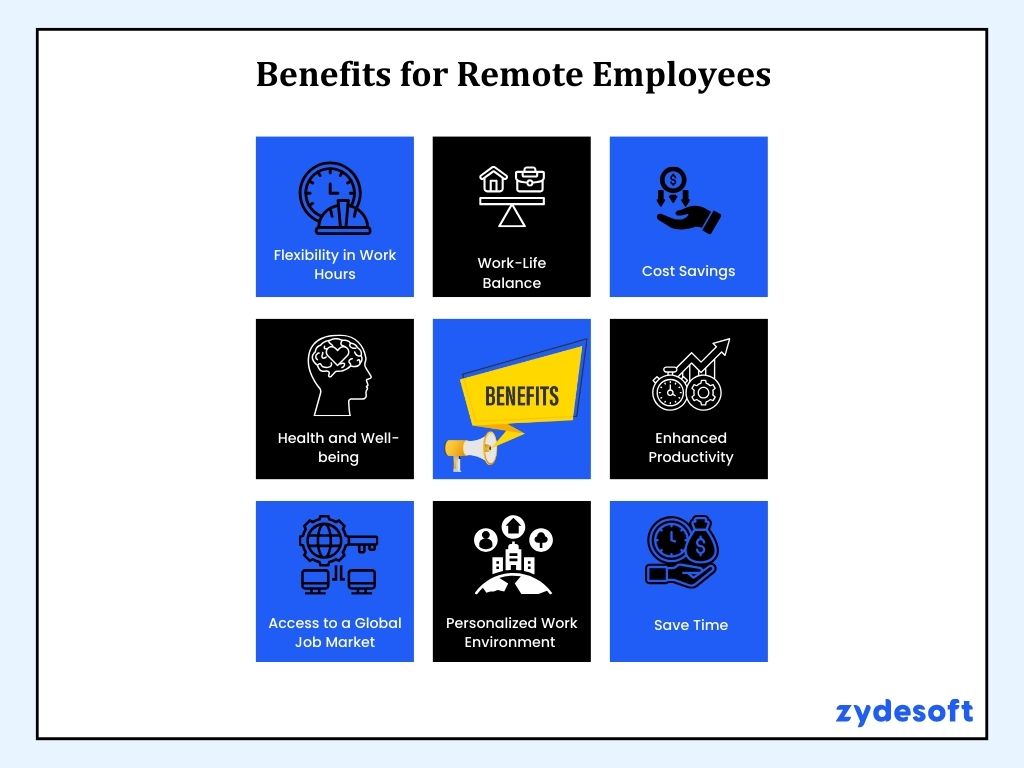
Remote teams are changing how businesses work by bringing together talented people from different locations worldwide. This way of working offers flexibility, encourages innovation, and makes workplaces more interactive. One major benefits of remote teams is improved employee satisfaction—according to research by Owl Labs and Global Workplace Analytics, 74% of employees report being happier when working from home, which directly boosts productivity and engagement.
Another major advantage is cost savings. Research shows that businesses can save around $11,000 per employee annually when they allow remote work at least part-time. These savings come from lower office costs, fewer sick days, and better employee retention.
Overall, remote teams help businesses save money, work more efficiently, and create new growth opportunities. Whether you’re a small business owner or part of a large company, switching to remote work could be the best decision for your success.
Remote work means performing your job from a location outside the traditional office, such as your home, a coworking space, or anywhere with internet access. It relies on technology like video calls, emails, and chat tools to keep teams connected and productive, no matter where they are. One of the key benefits of remote teams is that it allows employees to work efficiently without being tied to a physical office.
This flexible work style eliminates commuting, giving employees more control over their schedules and work environment. It also enhances remote employee benefits, such as improved work-life balance, reduced stress, and increased productivity. For businesses, the advantage of remote work includes access to a wider talent pool, higher employee retention, and reduced overhead costs.
Companies also experience significant cost savings with remote teams by cutting expenses on office space, utilities, and commuting allowances. Moreover, the benefits of hiring remote workers extend beyond cost reductions—businesses can attract top talent globally, leading to more innovation and efficiency. Whether part-time or full-time, remote work empowers people to collaborate and succeed from virtually anywhere.

The benefits for remote employees are extensive and transformative, improving both professional and personal aspects of life. Let’s explore the top advantages:

The benefits of remote teams go beyond improving employee satisfaction—they also provide significant advantages for employers. From cost reductions to enhanced productivity, here’s why businesses should embrace remote work:
While the benefits of remote teams are numerous, businesses must also address certain challenges to ensure a smooth and productive workflow. By identifying and overcoming these obstacles, companies can maximize the success of their remote workforce.
Challenge: Remote teams often face miscommunication due to limited face-to-face interactions, which can lead to misunderstandings and project delays.
Solution: Utilize collaboration tools like Slack, Microsoft Teams, and Zoom for regular check-ins. Establish clear communication guidelines and promote a culture of transparency to ensure all team members stay informed and aligned. Overcoming communication barriers strengthens efficiency and enhances the benefits of hiring remote workers.
Challenge: Working remotely can sometimes make employees feel disconnected from their colleagues, reducing morale and team cohesion.
Solution: Organize virtual team-building activities, encourage informal chats, and schedule regular video calls to maintain a sense of connection. A strong company culture fosters engagement and increases remote employee benefits, ensuring employees feel valued and supported.
Challenge: Managing teams across different time zones can lead to scheduling conflicts and slower project progress.
Solution: Use shared team calendars to identify overlapping working hours and implement asynchronous communication when possible. Rotating meeting times ensures fairness and inclusivity for all team members. Embracing flexibility is an advantage of remote work, allowing companies to collaborate effectively across borders.
Challenge: Employers may struggle to track employee productivity, while remote workers may find it difficult to stay focused without direct supervision.
Solution: Set clear expectations and use task management tools like Trello, Asana, or ClickUp to track progress. Regular check-ins, performance metrics, and goal-based evaluations help maintain productivity without micromanagement. This results-driven approach highlights the benefits of remote teams in fostering independent, motivated employees.
Challenge: Remote work relies on personal devices and potentially unsecured networks, increasing the risk of data breaches.
Solution: Provide employees with secure access to company resources using VPNs and enforce robust cybersecurity practices, including regular updates and multi-factor authentication. Educate the team on recognizing phishing and other online threats.
⮞ Onboarding Remote Developers
⮞ Find remote developers
⮞ Best Remote Job Sites
The benefits of remote teams extend far beyond just convenience—they are transforming the way businesses operate in today’s globalized world. By reducing costs, increasing access to top talent, and enhancing productivity, remote teams create opportunities that were once restricted by physical boundaries. They also promote better work-life balance, making employees happier and more engaged.
By embracing technology and adopting flexible work models, organizations can build more resilient, innovative, and inclusive teams. The shift to remote work isn’t just a passing trend; it’s a powerful, long-term strategy for sustainable growth and success in an ever-evolving business landscape.
1. How does the team benefit from remote working?
The benefits of remote teams include increased productivity, better collaboration across time zones, and reduced commuting stress, leading to improved efficiency and job satisfaction.
2. Why is remote work better?
Remote work provides flexibility, cost savings, and greater job satisfaction while offering benefits for remote employees such as improved work-life balance and access to global job opportunities.
3. Is remote work a competitive advantage?
Yes, companies that embrace remote work gain a competitive edge by attracting top talent, cutting operational costs, and enhancing remote employee benefits like flexibility and autonomy.
4. Why do workers prefer to work remotely?
Employees appreciate remote work for its flexibility, reduced commuting time, and improved work-life balance, all of which contribute to key remote employee benefits that boost overall job satisfaction.
5. Is it better to work onsite or remotely?
It depends on the role and personal preference. Onsite work fosters in-person collaboration, while remote work enhances autonomy and work-life balance, maximizing the benefits of remote teams.